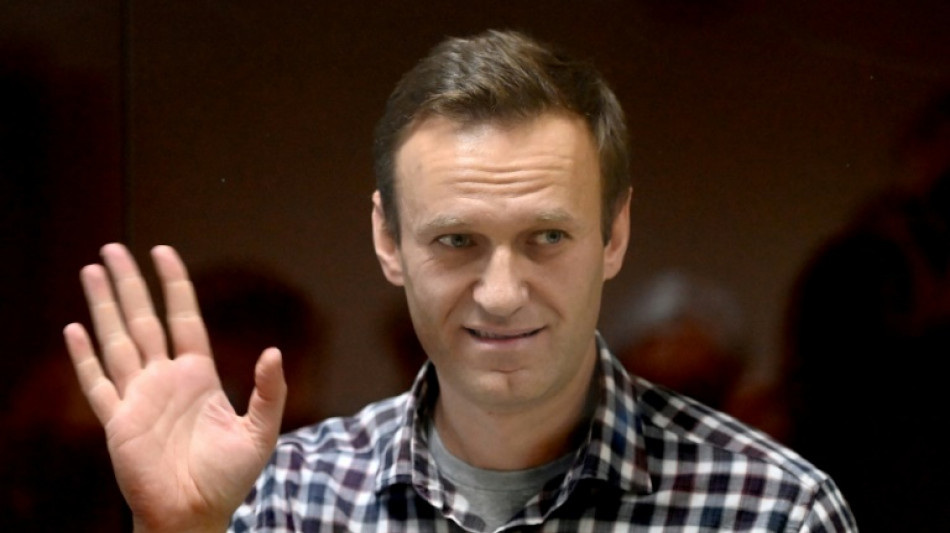

Russia adds Kremlin critic Navalny to 'terrorists' list
Russia on Tuesday added jailed Kremlin critic Alexei Navalny and a number of his allies to a list of "terrorists and extremists", as authorities further clamp down on the opposition.
Navalny and several allies, including key aide Lyubov Sobol, appeared Tuesday in a database of banned individuals compiled by the Federal Service for Financial Monitoring (Rosfinmonitoring).
The past year has seen an unprecedented crackdown on dissent in Russia, including the jailing of President Vladimir Putin's top critic Navalny last January and the outlawing of his political organisations.
Almost all of his top allies, including Sobol, have since fled the country.
According to Navalny's Anti-Corruption Foundation -- which was declared extremist and shut down last year -- a dozen Navalny allies were added to the list on Tuesday.
They include anti-corruption investigator Georgy Alburov, lawyer Vyacheslav Gimadi and several former coordinators of Navalny's regional offices that were also branded extremist last year.
The decision puts them on a par with right-wing nationalist groups and foreign "terrorist" organisations, including the Taliban and the Islamic State extremist group.
Sobol, 34, was a lawyer for Navalny's anti-corruption foundation and producer of the opposition politician's YouTube channel. She has been wanted by Russian police since October.
"Participated in elections and was fighting corruption? Extremist," Sobol tweeted.
- 'Super team of terrorists' -
Earlier this month, two other key Navalny aides -- Ivan Zhdanov and Leonid Volkov -- were added to the list.
They mocked the "terrorist" tag on Tuesday.
Volkov, who used to oversee Navalny's regional offices, tweeted that he was "proud to work in our team of 'extremists and terrorists'".
"It's great that our super team of 'terrorists' is being joined by such great people," Zhdanov, who headed the now-disbanded Anti-Corruption Foundation, said on Twitter.
The United States and European Union both condemned the move, which comes amid high tensions over fears of a Russian invasion of Ukraine.
"This latest designation represents a new low in Russia's continuing crackdown on independent civil society," US State Department spokesman Ned Price told reporters in Washington.
"We urge Russia to cease the abuse of 'extremism' designations to target nonviolent organizations, to end its repression of Mr. Navalny and his supporters, and to honour its international obligations to respect and ensure human rights and fundamental freedoms," Price said.
Last month, investigators questioned several former regional Navalny coordinators, including Ksenia Fadeyeva, who is also a lawmaker in the Siberian city of Tomsk. She was also added to the "terrorists" list on Tuesday.
- Navalny's brother -
Separately, in an apparent attempt to put further pressure on the opposition, prison officials have asked a Moscow court to convert a suspended sentence handed to Navalny's brother Oleg into real jail time.
On Monday, Moscow's Lyublinsky district court registered that request.
Last year, Oleg Navalny was handed a one-year suspended sentence for breaking anti-coronavirus restrictions during protests demanding his brother's release.
Navalny was detained in January 2021 on arrival from Germany, where he was recovering from a nerve agent poisoning attack he and the West blame on the Kremlin.
In February, he was jailed for more than two years on old fraud charges.
His poisoning and arrest sparked widespread condemnation abroad as well as sanctions from Western capitals.
The European Parliament last year awarded Navalny the Sakharov Prize for Freedom of Thought after he was nominated but passed over for the Nobel Peace Prize.
Investigators launched a new extremism probe against Navalny in 2021 that could see the opposition leader spend up to 10 more years in jail.
Authorities have designated dozens of rights groups, media outlets, journalists and anti-Kremlin figures "foreign agents".
In December, courts ordered the shutdown of the country's most prominent rights group, Memorial.
T.Abato--IM




